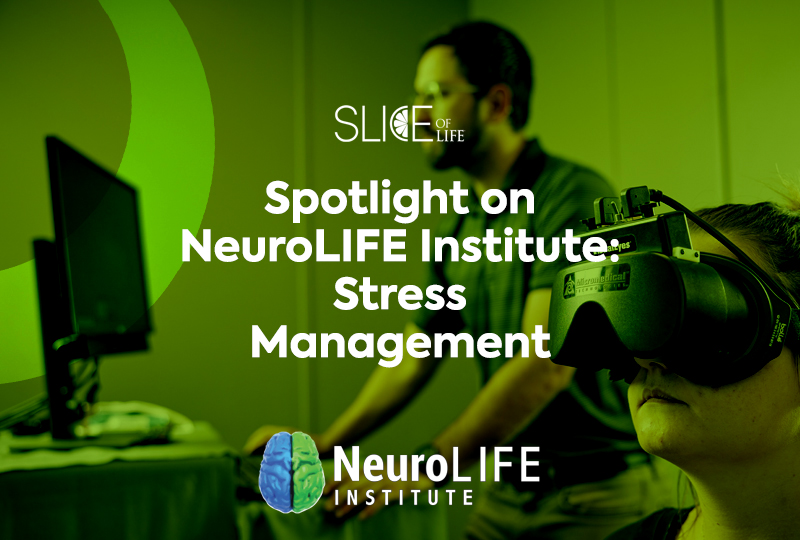Today we’re talking about stress. What an appropriate time to be talking about stress, as we all try to recover from a busy holiday season and welcome in the new year.
“Stress in general, we think of it as the ability to resist stress most times. Unfortunately, it’s fairly impossible to completely resist all stress at all times, and sometimes it can actually be used to our benefit. But the difference between those who might experience stress and it be a little bit too much [for them], versus those who experience stress and it seems to kind of make them stronger or they can roll right with it and navigate, is how strong the frontal lobe is,” said Dr. Dominic Fetterly, Director of the NeuroLIFE Institute (NLI). “The frontal lobe, in particular, is the same area of the brain that’s meant for movement and cognition, but it also turns the volume down on a lot of automatic processes so that we’re able to modify stress as it’s happening in real time.”
According to Dr. Fetterly, there are actions we can do to build those areas up, but we need to know where our energy leaking areas exist. When this happens, the frontal lobe must work much harder. Dr. Fetterly recommends we think of it as currency.
“We only have so much currency to spend. If all of it goes toward plugging holes in other parts of the brain, the frontal lobe can get really tired and exhausted; it doesn’t quite do the job that it’s meant to do, which is turning the volume down or inhibiting most of the stressor responses,” he shares.
The NLI measures the frontal lobe by how well a patient moves. They also look for how well a person processes things through their eye movements.
“There’s a lot of functions that are coordinated and designed for the frontal lobe that we can measure in our office, but there are things that a lot of people take for granted. For example, diet and exercise. One of the most metabolically active parts of the brain, well, really the top two, are the frontal lobe and the cerebellum. And they talk to each other so much. And when they lack proper activation, the other one suffers a little bit too,” explained Dr. Fetterly. “We think about the frontal lobe as our executive decision maker – the thing that is able to hold off stressors that are negative in our lives and allow us to see through it. The cerebellum is how we coordinate. So, when we talk about coordination, physical and mental.”
Life U is currently involved in a project to be presented in 2024 at the Association of Chiropractic Colleges Research Agenda Conference (ACCRAC) in San Diego, California. This project involves patients who are dealing with medication-resistant depression. This means that they have tried at least three depression medications, and they don’t work, but they’re still diagnosed depressed. They were brought into NLI for chiropractic adjustments and given balance exercises. The NLI is finding that people tend to get better with better coordination and balance.
According to Dr. Fetterly, “Physical balance can bring emotional balance. What we’re finding is people get better with coordination and balance, bringing down their stress scores. There’s a metric that we use called the stress, anxiety and depression score list. All three categories improve when we work on our balance and are getting adjusted. It’s a beautiful study that I’m really excited to see presented. We worked with [Associate Vice President of Research and Director, Dr. Sid E. Williams Center for Chiropractic Research Life University] Dr. Stephanie Sullivan on it, and it was a lot of fun seeing it go in the right direction with all the metrics getting better. So, in short, movement and balance play a huge role in how we manage mood and how we are able to tolerate stress. The areas responsible for that are the frontal lobe and partially the cerebellum, too, because they communicate so closely.”
This study, which recently ended, included a total of 20 participants. The hope is to eventually offer alternative options to medication, but the research must first be presented.
“The beautiful thing about the brain is that all of these functions are supportive of other parts of the brain too. So, if one area is a little tired, we can shift focus to another function that also supports the area. There are a lot of windows to the brain that we can select from, and not everybody is quite the same,” said Dr. Fetterly. “The more stresses that we experience, the harder things get. The other activities that aren’t quite keeping up like diet and exercise – the more it drains our battery. So really, what we need to do is find ways to recharge that frontal lobe and make sure it’s nice and strong.”
For more information regarding everything that NLI offers, please visit their website at NeuroLIFEInstitute.com.


Social Media